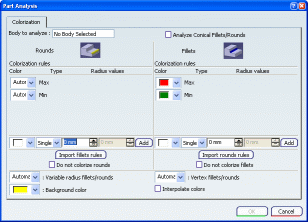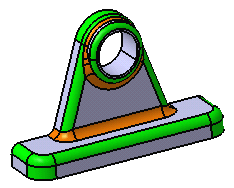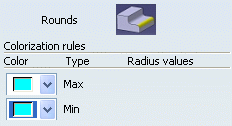Identify All Rounds and Fillets at a Time
You can graphically identify all the fillets and rounds of a 3D shape at a time.
Click Part Analysis
 in the Part Design Feature Recognition toolbar. in the Part Design Feature Recognition toolbar.
The Part Analysis dialog box appears. It is divided into two areas: the left side area is dedicated to the analysis of the rounds and the right side area is for the fillets analysis.

In the Body to analyze box, select Body.1 to identify the fillets and rounds.
Note:
- You can select the body either by clicking on a node in the
specification tree, or by selecting one of its face, edge or vertex in
the geometry area.
- Only one body can be analyzed at a time.
Select the orange
color for the Max and Min types in the Fillets area. Note:
By default, the rounds and fillets color is set to Automatic in the
Color
list. In this case, no
rule is applied. It does not mean that colors are changed to
the default colors.
Select the green
color for the Max and Min types in the Rounds area. Select the Interpolate colors check box
to color all the rounds and fillets.
Click OK to compute the results. An informative window appears, informing you that the body contains
27 fillets and 18 rounds. Click OK to close the informative window.
All the rounds and fillets of different radius values are graphically identified by
the green or orange colors respectively. These are constant radius fillets and rounds.


Identify All Rounds (or Fillets) Only
You can graphically identify all the rounds or fillets of a 3D shape at a time.
Now, if you want that only rounds should be colorized, click
Part Analysis  again. again.
The Part Analysis dialog box appears. Select the Do not colorize fillets check box in the Fillets
area. To improve the visualization of rounds, change the default grey color to blue for example. To do so, set the light blue color for the Max and Min types in the Rounds area.

Select the Interpolate colors check box to color all the rounds. Click OK to compute the results. A window appears, informing you that the body contains 27 fillets
and 18 rounds.
Click OK to close the informative window. All the rounds of different radius values are graphically identified by the light
blue color.

Note:
To know how to display the different categories of fillets and
rounds according to their different radius values, see Analyzing Fillets and Rounds of a 3D Shape.
|